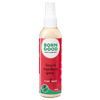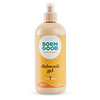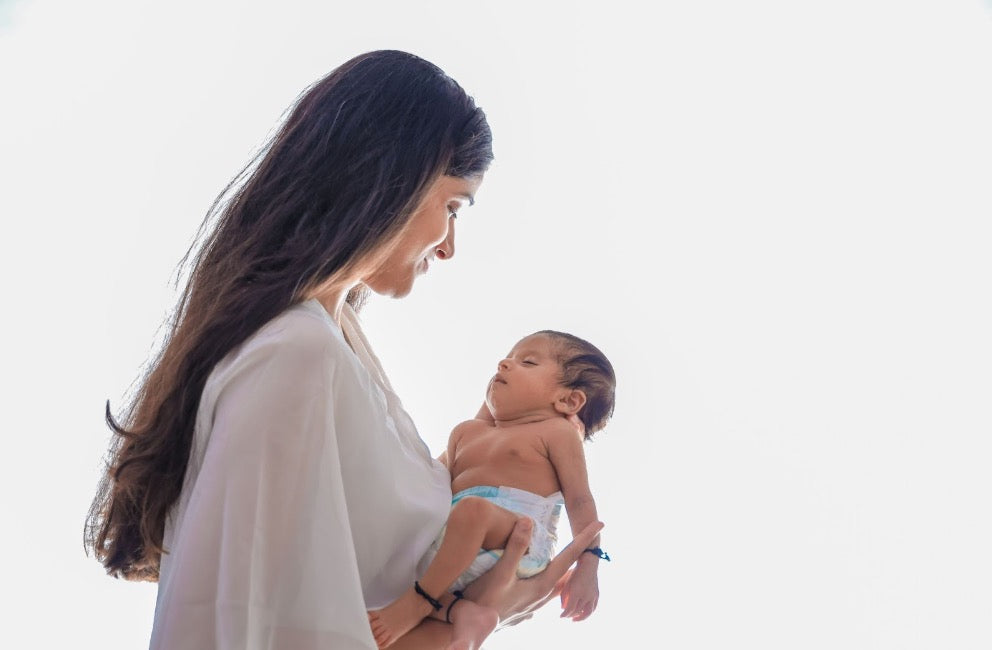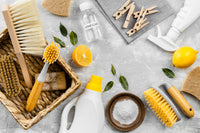Hello new mommy and daddy! Congratulations on getting started on this adventure.
It doesn’t matter if you are welcoming your first kid or having your second (or third, or fourth) child, becoming a parent is one of the most joyous and exciting times. Like everything else in life, it comes with its own challenges. Especially if you live an eco-friendly lifestyle, having a baby should not stop you from caring about the well-being of your planet. And trust us, you can do more than investing in eco-friendly cleaning products, floor cleaners, biodegradable utensils or storage containers. Your baby has many needs and you can fulfil most of them in a way that doesn’t harm the planet.
Read on to find out easy ways to care for your new baby in an environment friendly way
1) Accept hand me downs
Many parents want a new everything when they have a baby. However, newborns grow so fast and their needs change so frequently, that you can consider reusing at least the following:
Baby clothes: Babies outgrow their clothes so quickly, it can be very expensive to continuously replace them new ones. Instead, you can purchase second-hand or borrow from friends and another relatives which will save you money and reduces waste.
Baby toys: Babies develop and change rapidly in the first few years, and before you know it, they’ve outgrown not only their clothes but also their toys. Buying second-hand toys is a great way to reduce waste. Some cities also have toy libraries where you can borrow a few toys every month or so. Opt for less plastic and more cloth, bamboo or wooden toys.

Reusable nappies: While making the swap to reusable nappies is a great, eco-friendly option, it can be an expensive one. Instead of buying them brand new, there is a large market of perfectly usable, second-hand options available.You can even go for cloth nappies. They can be washed easily with a biodegradable liquid detergent, dried and reused.

2) Select organic laundry detergent and home cleaning products
It’s no secret. Babies are messy! And you are going to do a lot of washing and cleaning.
Some laundry detergents and stain fighters are made with powerful yet synthetic surfactants. These substances may not be safe for newborns since they can contribute to allergies and increase the chances of skin irritation. To help protect your baby from unnecessary chemicals, you can shop for laundry supplies like biodegradable liquid detergents that are made plant-based and natural ingredients.
Just like laundry products, there are a lot of eco-friendly home cleaning products that do not contain harmful chemicals like chlorine, phthalates, and formaldehyde. Choose them over the regular floor cleaners and do good for your baby & the planet.
3) Reduce the amount of food packaging
It’s important to make sure that your baby has the appropriate diet for their age, whether that is breast milk or formula. Breastfeeding is obviously as zero-waste as it gets, but baby food often comes in plastic pouches that can add up. If you have the time and the access to fresh fruits and vegetables, consider making your own purées. They're easier than you think.
Additionally, growing your own vegetables in a terrace garden or shopping at a local market or zero-waste grocery store not only reduces waste, but also has the added bonus of making your child conscious of waste from an early age.
4) Look at environment friendly baby bottles
While you are doing your bit by investing and using natural home cleaners, recycling baby toys and using cloth diapers, it is also important to have a relook at the feeding bottle. Earlier, glass bottles were used to feed the babies but as plastic gained popularity, thanks to durability and low cost, this became a more popular choice.
However, research has shown that plastic baby bottles could have toxins and of course, they aren’t great for the environment either. Glass bottles are an environmentally friendly and durable option, but the break-ability issues are still prevalent - even with the shatterproof varieties. A silicone or cloth sleeve reduces the risk of breakage. Stainless steel baby bottles are also a good alternative and some of the insulating variants can keep milk warm for longer, too.
5) Get outside more
Children should spend time outside, even when they are babies. Enjoy a day out by taking your baby to the local park in a pram, or go on a short walk in your neighbourhood.
Pro-Tip: Strollers are usually well-built and can last for many years. Avoid buying one, and thrift or borrow instead!
Time outside appreciating nature will be hugely beneficial to the baby’s development, and any hours that you aren’t in the house are hours that you won’t be spending consuming electricity or cleaning after your baby! Once your baby is bigger, you could even think about longer hikes or camping trips for holidays.

By following these tips and careful things, you will not only raise your child in a healthy way but will also be able to develop an environment-conscious mind. While your baby might not be able to remember the efforts you made to be sustainable while they were young, it will leave an impression on them, and they will likely adopt these practices subconsciously and use them in their life for many years to come.









